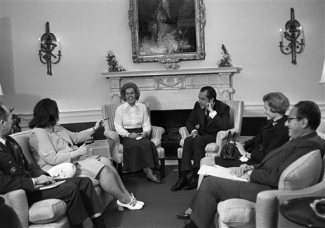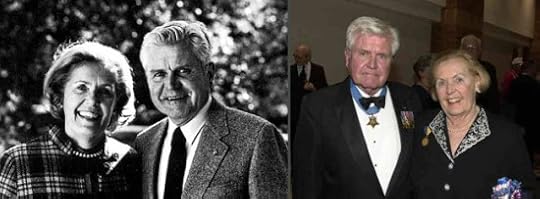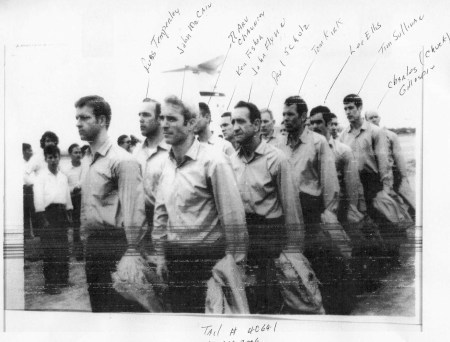Undaunted and Unafraid: How Courageous Leadership Always Makes a Difference

Some of the women in The National League of POW/MIA Families with President Nixon.
(Editor’s Note: Lee Ellis is introducing a new monthly coaching video message for leaders, and his new coaching message goes deeper into the topic of this article. In it, he introduces three important points that all leaders must use during challenging times. Sign up to receive Lee’s Leading with Honor �� Coaching messages on our website.)
By Lee Ellis
If you and your team are striving to meet your goals while affecting positive change and success in your organization or community, keep pressing forward and don���t give up. I���m a deeply grateful benefactor of a willing and steadfast group of women leaders that succeeded in this effort many years ago. Let me share an inspiring leadership story with you.
I write and speak often about the courageous leaders in the POW camps of Vietnam, men like Stockdale, Denton, Bud Day, Galanti, and Mulligan, who courageously led me and my comrades through the dark years of our imprisonment. But you may not have heard of their heroic wives. There is much we can learn from what Paul Harvey would call ���the rest of the story.���
Small Beginnings
By 1969 many families had been waiting three years or more for news about their missing or POW husband, father, son, or brother. Most had never received an accounting, few had received letters. Slowly the word began to leak out about the torturous and inhumane life that the POWs were living. Waiting families had been told by the U.S. government to keep quiet and not make waves about the POW plight, that it might cause us more harm than good. But kids were growing up without fathers, wives were desperate to hear the fate of their husbands, and one could only imagine how long the POWs could survive in the clutches of their brutal captors.
Locally in places like Southern California, Virginia, Dallas, Florida, and Virginia in 1969, wives began to meet and discuss their plight. Something had to be done to help their men. The small but dedicated efforts of a few concerned women quickly grew into a national movement that encompassed the nation, crossing political boundaries, including members with both pro-war and anti-war perspectives. They were united around a common vision to ���
bring attention to the POW/MIA plight.
gain a full accounting of missing servicemen.
get better treatment so that the POWS would be treated according to the humane guidelines of the Geneva Accords.

President Richard Nixon meets in his office at the White House in Washington , May 15, 1972, with representatives of the National League of Families of American Prisoners and Missing in Southeast Asia. In attendance are, from left: Gen. Brent Scowcroft, presidential Air Force aide; Maureen A. Dunn of Randolph, Mass.; Sybil E. Stockdale of Coronado, Calif.; Nixon; Phyllis E. Galanti of Richmond, Va.; and Henry Kissinger, assistant to the president. (AP Photo/John Duricka)
Pressing Forward with Determination
Sybil Stockdale took the lead as the first Chairman of The National League of POW/MIA Families. She quickly saw that the Nixon administration didn���t want the political embarrassment of having these women call them out for their inaction on such a high profile issue. Using this leverage and undaunted by her lack of expertise and experience in matters of national policy, Sybil along with other wives like Louise Mulligan, Phyllis Galanti, Carol Henson (Hickerson), Elaine Grubb, and others secured meetings with President Nixon and Henry Kissinger.
“Seeing the light, the administration got on board and began to hammer the North Vietnamese for a full accounting and better treatment.”
The League of Families mobilized public opinion nationally and locally. In Virginia alone, Phyllis Galanti (wife of 6 �� year POW Paul) solicited almost a million letters, taking them personally to the North Vietnamese delegation in Paris. Supported by Ross Perot and others, many of the wives flew to Paris to bravely and passionately confront the communist on our treatment. My mother and brother, both school teachers took time away to speak to organizations in surrounding communities, getting petitions to the communist government signed at every stop. Our captors thrived on anti-US propaganda, but when the light of negative PR hit them, it was a new day for me and my comrades.
Brutal Realities and Changing Times
Sybil Stockdale knew that things were probably bad for her husband, but she had no idea how bad. He had been there for four years and by 1969 had been isolated with ten buddies at Camp Alcatraz for almost two years. In this hellhole of camps, they were beaten down physically, emotionally, and mentally. CDR James Bond Stockdale had smashed his face to a bloody pulp to avoid being used as an actor in a propaganda video. But now they were losing hope and rather than lose his ability to resist the enemy Stockdale took a shard of broken glass and slit his writs. Guards found him unconscious, bleeding out on a filthy floor and brought him back. Unfortunately, they were still determined to continue this tortuous treatment with this senior leader whose leadership and resistance had undermined their efforts to subdue the POWs.

Past photos of James and Sybil Stockdale.
“Thankfully as a direct result of the leadership and actions of the League of Families, the torture stopped immediately, Alcatraz was closed, treatment improved and life became much more ���live and let live��� for all POWs.”
Dramatic improvements in our treatment were occurring even though Sybil, Phyllis, Carol, Louise, Elaine, Doris and all the families and supporters had no proof that their efforts were helping us. After the Paris Peace Accords were signed on January 27, 1973 ending the U.S. involvement in the Vietnam War, the agreement required the release of all captured servicemen within sixty days. Most of us who survived the first few months of capture made it through five, six, seven, even eight years to finally enjoy repatriation.

A release photo in 1973. Lee Ellis (pictured on the right row, 4th man in the line) is pictured with some of his comrades including now Senator John McCain (pictured in the right row, first man in the line).
When we came home and learned what the National League of POW/MIA Families had done (and continues to do even today), it was easy to connect the dots and see the cause and effect involved.
“Looking back, I shake my head in amazement at the leadership impact of these women who literally changed the course of history and in doing so saved their husbands and family members��� lives. And now you know the rest of the story.”
As a leader today, how can you benefit from their courageous example? Keep in mind that leadership always makes a difference. With no apparent power or position, these families changed the national policies of two nations at war. Choose to be a courageous leader that makes a positive difference in the world around them.
LE
P.S. Don’t forget to sign up and receive my free monthly video coaching on leadership growth and development. Click here to sign up.




